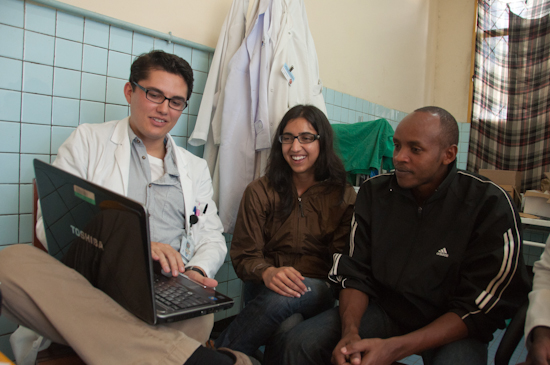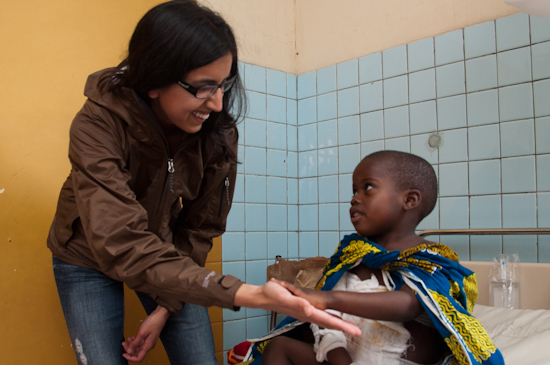UC Davis Medical Residents Support Gorilla Health Through Human Health
By Gorilla Doctors Staff on Tuesday, October 18th, 2011 in Uncategorized.This month and last, MGVP has been hosting residents from the UC Davis Medical at our headquarters in Rwanda. As part of our One Health initiative to improve gorilla health by supporting human health programs, the doctors are working with patients and staff at the local Ruhengeri Hospital. Dr. Uppinder Mattu, a third-year resident currently volunteering, explains why she came to Rwanda and what she is learning.
 UC Davis Residents Drs. Brooks and Uppi with Dr. David.Last year, several of our residents came to Rwanda to work at Ruhengeri Hospital and had a great experience. I had been involved in an international medicine in the past, visiting Honduras as a medical student. From that experience, I learned that in order to be successful in an international medical program, a sustainable project is key. So I jumped at the opportunity to come to Rwanda and work at an established hospital. My hope was that with limited diagnostic testing, I could improve my physical exam skills. I also expected to see interested pathology.
UC Davis Residents Drs. Brooks and Uppi with Dr. David.Last year, several of our residents came to Rwanda to work at Ruhengeri Hospital and had a great experience. I had been involved in an international medicine in the past, visiting Honduras as a medical student. From that experience, I learned that in order to be successful in an international medical program, a sustainable project is key. So I jumped at the opportunity to come to Rwanda and work at an established hospital. My hope was that with limited diagnostic testing, I could improve my physical exam skills. I also expected to see interested pathology.
I was not disappointed. At Ruhengeri Hospital, I have seen incredible things. One example is of a seven-month-old girl who was brought to the hospital because of a cough and high breathing rate. Upon arrival to the hospital, the baby was not moving. The chest X-Ray showed a large fluid collection (a pleural effusion) in the right lung. Three days prior, she had had a right axillary abscess incised and drained. Most likely, during the incision and drainage, some of the bacteria from the abscess got into her lung. This is a very dangerous infection that would be complicated to manage even in the U.S. I was very worried for the young girl. However, Dr. David, the bright Rwandan doctor we work with, used IV tubing and an ordinary water bottle to create a makeshift drain for the pus. It worked! Two weeks later, the pus collection in the lung is almost resolved and the young girl is now eating and alert. From experiences such as this, I have learned to be more versatile and resourceful.
 Dr. Uppi with a patient.I have also seen pathology such as Typhoid fever, tetany, and cerebral malaria…things I may never encounter in my practice in the U.S. Obviously, I have gained a lot from this experience, and so I hope to give back. My fellow resident, Brooks Kuhn, and I have started a research study to determine sensitivity of Salmonella Typhi, the organism that causes Typhoid fever, to various antibiotics.
Dr. Uppi with a patient.I have also seen pathology such as Typhoid fever, tetany, and cerebral malaria…things I may never encounter in my practice in the U.S. Obviously, I have gained a lot from this experience, and so I hope to give back. My fellow resident, Brooks Kuhn, and I have started a research study to determine sensitivity of Salmonella Typhi, the organism that causes Typhoid fever, to various antibiotics.
Each day I look forward to waking up, walking to the hospital, surrounded by the fog and the mountains.


 Donate
Donate